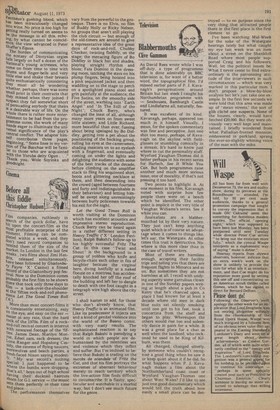Television
Blabbermouths
Clive Gammon
As David Rees wrote while 1 was off-duty, a type of programme that is done admirably on BBC television is, for want of a better word, the topographical film. I'd missed earlier parts of P. J. Kavanagh's peregrinations around Britain but last week I caught his Northumbrian programme with — Seahouses, Bamburgh Castle and Lindisfarne all, naturally, featured.
It was excellent of its kind. Kavanagh, perhaps, appeared too much in it himself. Visually, I mean, for the spoken commentary was fine and perceptive. Just one shot too many, perhaps, of Kavanagh on the skyline with fieldglasses or stumbling comically in a stream. It's hard to know just where to cut the personality stuff. Wynford Vaughan-Thomas did it better perhaps in his recent series for Harlech, See It While You Can. But both programmes raise another and much more serious issue, one of morality, if that's not pressing it too hard.
Two points to highlight it. At one moment in his film, Kavanagh noted with surprise how few people there were on a beach which he identified. The other point is implicit in the very title of Vaughan Williams's series. See it while you can.
Journalists are a blabbermouthed lot by their very nature. They just can't keep anything quiet which is of course an advantage when it comes to things like, let's say, the Watergate. At other times this trait is destructive. Nowhere is this more clear than in the case of travel writers.
Most of these are harmless enough, accepting their facility trips and telling you that there are frequent flights to Minorca and so on. But sometimes they are not harmless at all. I recall with undying asperity some garrulous clown
in one of the Sunday papers writing at length about a pub in Co
Kerry that he's chanced upon, a place I had known for at least a decade where old men in dark blue suits sat silently smoking until one got to his feet, took a concertina from the shelf and began to play. Whereupon the
others would rise too and solemnly dance in pairs for a while. It
was a great place for a chat as well when the landlord, who reckoned he used to be King of Kilburn, was there.
All changed, changed utterly, by someone who couldn't recog nise a good thing when he saw it or keep quiet about it if he did. So what happens when P. J. Kavanagh makes a film about the Northumberland coast coast or Wynford Vaughan-Thomas one about West Wales? I'd like to see just one good documentary which would tell the truth about how easily a small place can be des troyed — to no purpose since the very thing that attracted people there in the first place is the first element to go.
I've been watching Mid-Week for the sake of the Watergate hearings lately but what caught my eye last week was an item about a street on the Shankhill Road where most people supported Craig and his followers. Well, let the political issues be, What I never cease to find extra, ordinary is the patronising attitude of the interviewers in such circumstances — which was very marked in this particular item. I don't propose a blow-by-blow analysis but let's just take one example. In the first few seconds we were told that this area was made up of 'mean streets,' the sort of glib cliche one suspects. None of the houses, clearly, would have fetched £20,000. But they were obviously very well kept and maintained. I briefly wondered from what Palladian-fronted mansion, embowered in parkland, sprang the ever-so-slightly whining voice of the man with the mike.


































 Previous page
Previous page